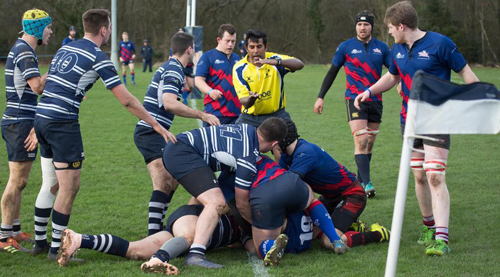Wekadapola volunteers to help Sri Lankan rugby referees

Bandara Wekadapola, officiating a game in London, is keen to help his native country
Rugby referees in Sri Lanka have always come under the microscope every season being made convenient scapegoats by officials and fans whenever their team loses. The 2019/2020 Dialog Club Rugby League Championship was no exception with some matches being played under protest against the designated local referee.
Some referees have been accused of bias, being incompetent and even lacking knowledge of the rules. The bottom line is respect for referees has diminished with spectators hounding the referee than for mistakes made by players. Gone are the days when people of the calibre of Lionel Almeida, Denzil Kobbekkaduwa, C.H. Seneviratne, Tony Amit, Anton Benedict, Daya Jayasundera, S.W. Chang to name a few, commanded respect on and off the field whenever they blew the whistle.
Amid this gloomy scenario, a member of the London Society of Rugby Football Union Referees (LSRFUR) has sprung to the defence of beleaguered local referees.
“My personal view is there are no issues with current potential of referees. The issue is their lack of knowledge about game management because they are not getting enough advice from their Referee Coaches,” said Bandara Wekadapola, an accredited Level 7 referee of the London Society.
He blamed factionalism within the Sri Lanka Society of Rugby Football Referees (SLSRFR) and indifference of Sri Lanka Rugby (SLR) for this crisis.
“During the last 10 to 15 years the same bunch of people have been managing the society (SLSRFR). They don’t have a vision, policy or guidelines to follow. How can we expect anything from them? They don’t know how to review a game either,” said the former Kingswood and Police back-row-forward.
He further stressed the society failed to produce a single top class referee after Nizam Jamaldeen, Dilroy Fernando and Anura Rankothge. Wekadapola also faulted the SLR for showing lack of faith in local referees by inviting foreigners to blow key matches.
“When local referees fail to produce good quality performance, the Union (SLR) patches up by importing foreign referees to blow in the League. Is this the real answer for this issue? Not at all,” said Wekadapola.
The main issue, according to him, is the lack of Referee Advisors/Referee Coaches for the local officials.
“If they are capable of identifying the referees’ issues, within two or three month’s time, they can easily rectify those issues,” he said urging veteran referees who have been sidelined by the Sri Lankan society to join forces and raise the standard of local referees.
“The question arises what happened to our experienced senior referees? We can’t see them. Why are they staying away from the game,” queried Wekadapola who is the only Asian in the London Society.
“In one season I get to blow 40-50 matches appointed through the Society. Up to now I managed more than 500-600 games in London and still continue,” said the 45-year-old who emigrated to London to pursue higher studies in 2005.
In 2016, he successfully completed Referee Advisors course and joined the London Society Referee Advisors panel.
“Since then I am offering my volunteer service as Active Referee and Referee Advisor,” said Wekadapola, who was selected in 2018 by London Society as their Representatives to Middlesex County RFU West Region Clubs Council.
“As a Sri Lankan it was a great honour and a great opportunity for me to engage with club management,” said Wekadapola, who counts among his many accomplishments as a referee officiating the Imperial Varsity match in 2013 at Twickenham Stoop (home of Harlequins RFC) and also various Cup finals, including Middlesex School Cup final at Allianz Park (home of Saracens RFC). He also refereed two Women’s Premiership matches between Richmond Ladies vs Aylesford Bulls Ladies and Saracen Ladies vs Wasp Ladies in 2015.
Keen to share his expertise and knowledge, he brought to London RFU Referee Development Officers to conduct a two-week course in Sri Lanka.
“We identified lot of potential referees and urged the Society to carry on with these guys. There were some girls as well. We wanted them to be taken on board and develop them. Unfortunately it did not work. They are still calling us saying nobody is carrying on from there,” he said. Wekadapola also requested the Sri Lankan society to nominate two referees for the Rosslyn Park tournament without success. Frustrated by the lack of cooperation with his Sri Lankan counterparts, he took the personal initiative to coach Rohan Fernando spending 47 hours of his time via Viber. Last week he launched an online programme with the participation of 10 ‘A’ division referees from Sri Lanka.
Asked for his suggestions to improve the standard of referees in Sri Lanka, he said: “We need to build a proper advisory panel who can identify referees’ capability and performance. Also we need to create another group as Referee Coaches who are clearly responsible for referee development. For this we need to put the right people in the right place. Also recruit recently retired senior referees as Referee Advisors and Coaches, and use their experience and train them on how to watch a referee, how to build report and assessing referees capability.”
“Sri Lankan referees are very good. They have very good ability to referee. The attitude of Sri Lankans should change. When a foreign referee comes, they overlook his mistakes. But local referees need to earn respect by doing the right thing. They must also not forget the entertainment factor. Spectators are the lifeblood of the sport. Referees should not act like policemen but allow the game to flow,” advised Wekadapola.



